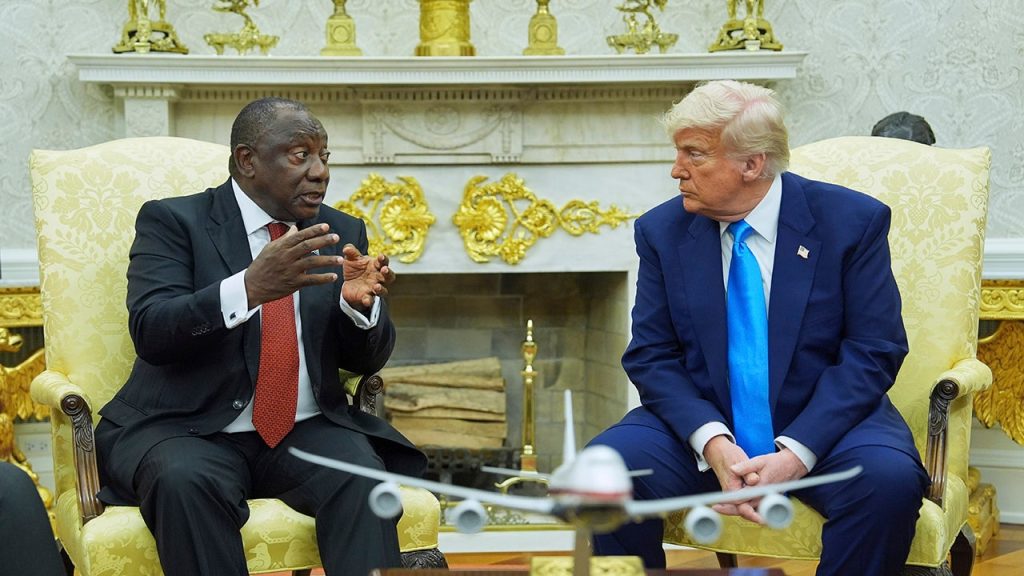In a recent development involving the South African political landscape, President Cyril Ramaphosa has defended his country’s sovereignty in response to former U.S. President Donald Trump’s remarks regarding Julius Malema, a prominent opposition figure. Trump’s demand for Malema’s arrest came after he was seen chanting inflammatory slogans during a rally. This situation highlights the ongoing tensions surrounding land reform and racial tensions in South Africa, as well as differing views on freedom of expression in the political arena.
| Article Subheadings |
|---|
| 1) Context of Trump’s Remarks and Malema’s Response |
| 2) Implications of the “Kill the Boer” Chant |
| 3) Ramaphosa’s Stance on Sovereignty and Free Speech |
| 4) Political Reactions and Community Divisions |
| 5) Safety and Violence in Agricultural Communities |
Context of Trump’s Remarks and Malema’s Response
In a politically charged moment, President Donald Trump had aired a video during a meeting with President Cyril Ramaphosa, showing Julius Malema chanting, “Kill the Boer,” a phrase that has stirred considerable controversy. This incident occurred during Trump’s broader criticisms of South African land reform policies, which he characterized as racially charged and detrimental to the country’s white farming community. In response, Malema, the leader of the Economic Freedom Fighters (EFF) party, defiantly addressed a large crowd at a rally, asserting his resolve to continue chanting, “I will never be intimidated by Donald Trump.” This exchange encapsulates the ongoing tensions between external political influence and domestic politics in South Africa.
Implications of the “Kill the Boer” Chant
The chant “Kill the Boer,” often invoked by Malema, has sparked debates about its implications in the context of South African society, particularly regarding its potential to incite violence. The phrase, rooted in a history of liberation, is seen by some as a remnant of resistance against apartheid, while others view it as a dangerous call to arms that fuels racial animosity. Critics argue that the chant contributes to a climate of hatred and fear, particularly among white farmers, whose communities have faced violence and land disputes in recent years. The instance also raised questions about the legality of Malema’s expressions and whether they fall under the protection of free speech or should be met with legal repercussions.
Ramaphosa’s Stance on Sovereignty and Free Speech
President Ramaphosa’s reaction to Trump’s comments underscored his commitment to South Africa’s sovereignty and its judicial independence. Ramaphosa stated, “It’s not a matter where we need to be instructed by anyone to go and arrest this one (Malema).” He emphasized that South Africa operates under its own laws and constitution, which includes guarantees of freedom of expression. In a landmark ruling by the Constitutional Court in 2022, the court deemed the chant as a liberation song rather than a direct incitement to violence, thereby complicating the narrative surrounding Malema’s actions and galvanizing discussions around the boundaries of free speech versus hate speech in South Africa.
Political Reactions and Community Divisions
The political aftermath of this controversy has illustrated deep divisions within South African society. Ian Cameron, a member of the main opposition party, the Democratic Alliance (DA), condemned Malema’s repeated incitement, describing it as a tool of division that exacerbates societal tensions. Cameron asserted, “That chant has no place in a democratic South Africa,” highlighting the potential for Malema’s rhetoric to inflame existing issues. The DA’s stance reveals a growing consensus among some political circles that stronger legal measures should exist to address hate speech and its implications for social cohesion.
Safety and Violence in Agricultural Communities
The backdrop of this political exchange is the alarming rate of violence against farmers in South Africa, both black and white. Discussions surrounding farm attacks often evoke images of brutal violence and serve as a reminder of the complex social and economic issues at play. Cameron noted the traumatic experiences he has witnessed in the aftermath of such attacks, stating, “I’ve personally stood in the aftermath of these attacks. I’ve walked into scenes that resembled abattoirs.” This reality highlights the urgent need for discussions on agricultural safety and comprehensive measures to ensure the protection of farmers, regardless of race.
| No. | Key Points |
|---|---|
| 1 | President Ramaphosa faces scrutiny over Julius Malema’s inflammatory chants. |
| 2 | Trump’s remarks have ignited a debate on racial tensions in South Africa. |
| 3 | Legal interpretations of hate speech play a crucial role in the current discourse. |
| 4 | Evolving dynamics around farm attacks raise alarm about agricultural safety. |
| 5 | Political divisions are increasingly visible in South Africa amidst the controversy. |
Summary
The ongoing discourse around Julius Malema’s rallies and Donald Trump’s interference showcases the complexities of racial tension in South Africa. As President Ramaphosa upholds the nation’s sovereignty, the legal and ethical implications of free speech versus hate speech continue to be grappled with. This debate is fueled by real societal issues surrounding safety and violence in agricultural communities, indicating that the path forward requires careful navigation of these sensitive topics.
Frequently Asked Questions
Question: What sparked Trump’s call for Malema’s arrest?
Trump’s call for Malema’s arrest was prompted by a video showing Malema chanting “Kill the Boer” during a rally, which has raised concerns over hate speech.
Question: How does South African law treat the chant “Kill the Boer”?
The Constitutional Court ruled that the chant is a liberation song and not an incitement to violence, thereby complicating its legal status within the context of free speech.
Question: What are the implications of Malema’s rhetoric on South African society?
Malema’s rhetoric is seen as divisive, contributing to existing societal tensions and potentially inciting violence, particularly in relation to farm attacks.
